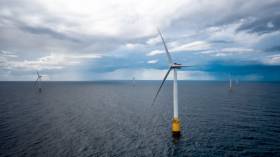Displaying items by tag: Hywind
World’s First Floating Windfarm Now Powering Scotland
#Windfarm - The world’s first floating windfarm is now generating power for Scotland, according to BBC News.
Afloat.ie previously covered the Hywind Scotland project, backed by Norwegian energy giant Statoil, which comprises a series of giant wind turbines tethered to the seabed off the coast of Aberdeenshire.
The 6MW, 175-metre-tall turbines in this pilot project are said to generate enough energy to power as many as 20,000 homes.
Scotland’s First Minister Nicola Sturgeon officially opened the windfarm this week, saying it “underlines the potential of Scotland's huge offshore wind resource and positions Scotland at the forefront of the global race to develop the next generation of offshore wind technologies.”
Recently a tidal power station in the far north of Scotland announced it had broken the world record for electricity generation, as The Independent reports.
The company behind the MeyGen project say they generated 700 megawatt hours of energy in the month of August from its more than 250 turbines installed on the sea bed in the Pentland Firth between Orkney and the Scottish mainland.
Floating Windfarm For Scottish Waters
#Windfarm - Scotland is set to host the first floating offshore windfarm in British and Irish waters, as the Guardian reports.
Backed by Norwegian energy giant Statoil, the Hywind Scotland project will comprise five 6MW turbines interconnected by cables and anchored to the seabed, generating energy to power as many as 20,000 homes.
Construction is set to begin off mainland Scotland's easternmost point at Peterhead in the new year, and is expected to see reduced generating costs well below £100MWh.
It's also hoped that the pioneering scheme will lead to the use of more remote and deeper water sites for the windfarms of the future.
The Guardian has more on the story HERE.
























































